Setting our Sights on CITES
Using the power of the Convention on International Trade in Endangered Species of Wild Fauna and Flora (CITES) to help protect marine species
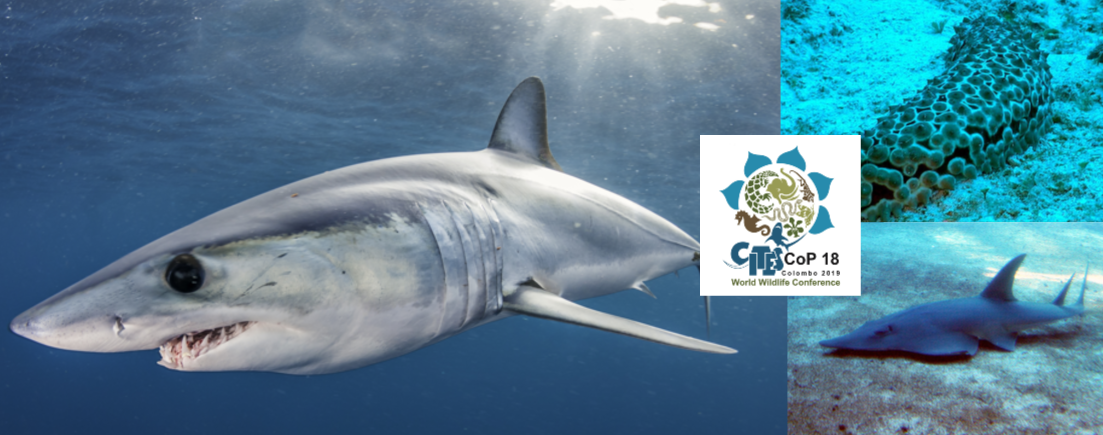
International trade in wild plants and animals is estimated to be worth billions of dollars a year and, in too many cases, it threatens species survival. Project AWARE uses the power of the Convention on International Trade in Endangered Species of Wild Fauna and Flora (CITES) to help protect threatened, commercially valuable marine species, sharks and rays in particular - sought for fins, wings, gill plates, meat, oil, teeth and cartilage – from the devastating effects of unregulated, international trade.
During the Conference of the Parties to CITES (CoP18) – held in Geneva, Switzerland from 17 to 28 August 2019 – countries that have agreed to implement the Convention reviewed 57 proposals, ranging from giraffes, elephants, butterflies, cedar trees and even wooly mammoth tusks, to consider adopting trade restrictions on these species. At this meeting, the marine species put forward for consideration included the two species of mako shark, guitarfish, wedgefish, and sea cucumbers.
Focus on #CITES4Sharks
At the annual meeting of the CITES Standing Committee, held in Moscow in October 2018, the Governments of Senegal, Sri Lanka, and Mexico announced that they would sponsor proposals to list 6 species of guitarfish and 10 species of wedgefish under Appendix II which restricts international trade only to populations that are deemed sustainable. Mexico also voiced their support for mako sharks and confirmed that they would be submitting a proposal to list both species of mako shark (Longfin and Shortfin) on Appendix II, bringing the number of elasmobranchs being considered for listing to 18.
Project AWARE, together with partner organizations and shark advocates around the world, is committed to ensuring progress for sharks and rays but we need YOU.
Using CITES to set our sight on Top Fishing Nations
Since the announcement by Mexico in Moscow, 27 countries and the European Union have confirmed their support for the listing of both shortfin and longfin makos, the world’s fastest sharks, for Appendix II listing.
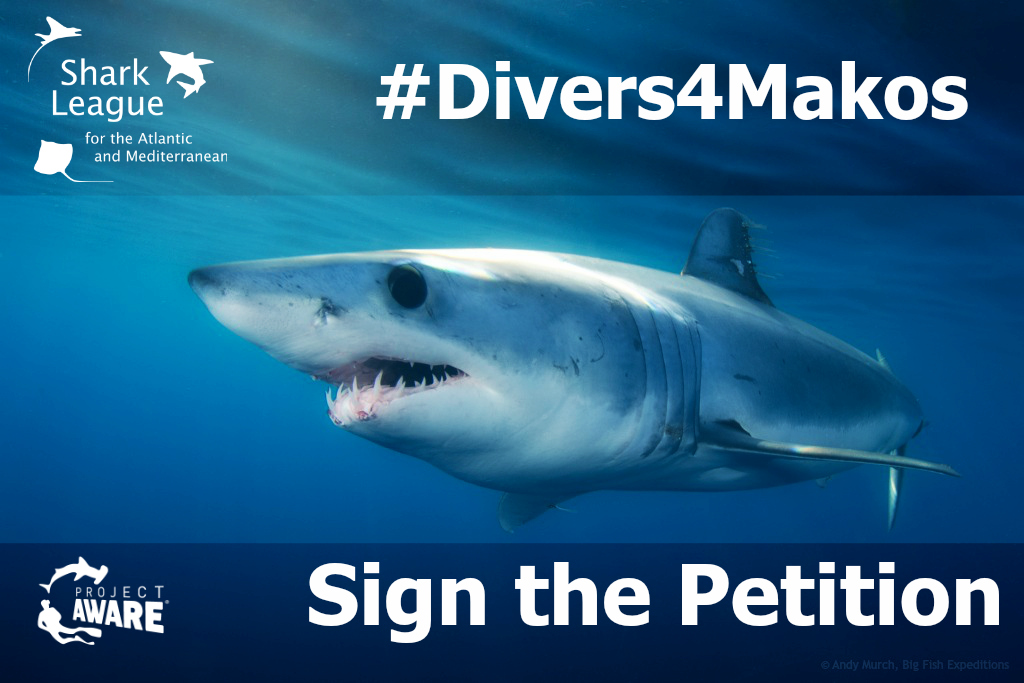 Project AWARE and our partners in the Shark League have been pushing for reducing fishing pressure on mako sharks for a number of years, backed by everyone who signed our #Divers4Makos petition. In August 2019, we were thrilled to help secure their inclusion on CITES. It now gives us more ammo to push fishing nations to limit their catches. CITES only partially restricts international trade in listed species and doesn’t put any obligations on countries to reduce fishing pressure. Project AWARE will make sure that countries who supported listing these species on CITES Appendix II, will then follow through with these commitments to actively reduce fishing pressure on mako sharks, and other vulnerable shark and ray species.
Project AWARE and our partners in the Shark League have been pushing for reducing fishing pressure on mako sharks for a number of years, backed by everyone who signed our #Divers4Makos petition. In August 2019, we were thrilled to help secure their inclusion on CITES. It now gives us more ammo to push fishing nations to limit their catches. CITES only partially restricts international trade in listed species and doesn’t put any obligations on countries to reduce fishing pressure. Project AWARE will make sure that countries who supported listing these species on CITES Appendix II, will then follow through with these commitments to actively reduce fishing pressure on mako sharks, and other vulnerable shark and ray species.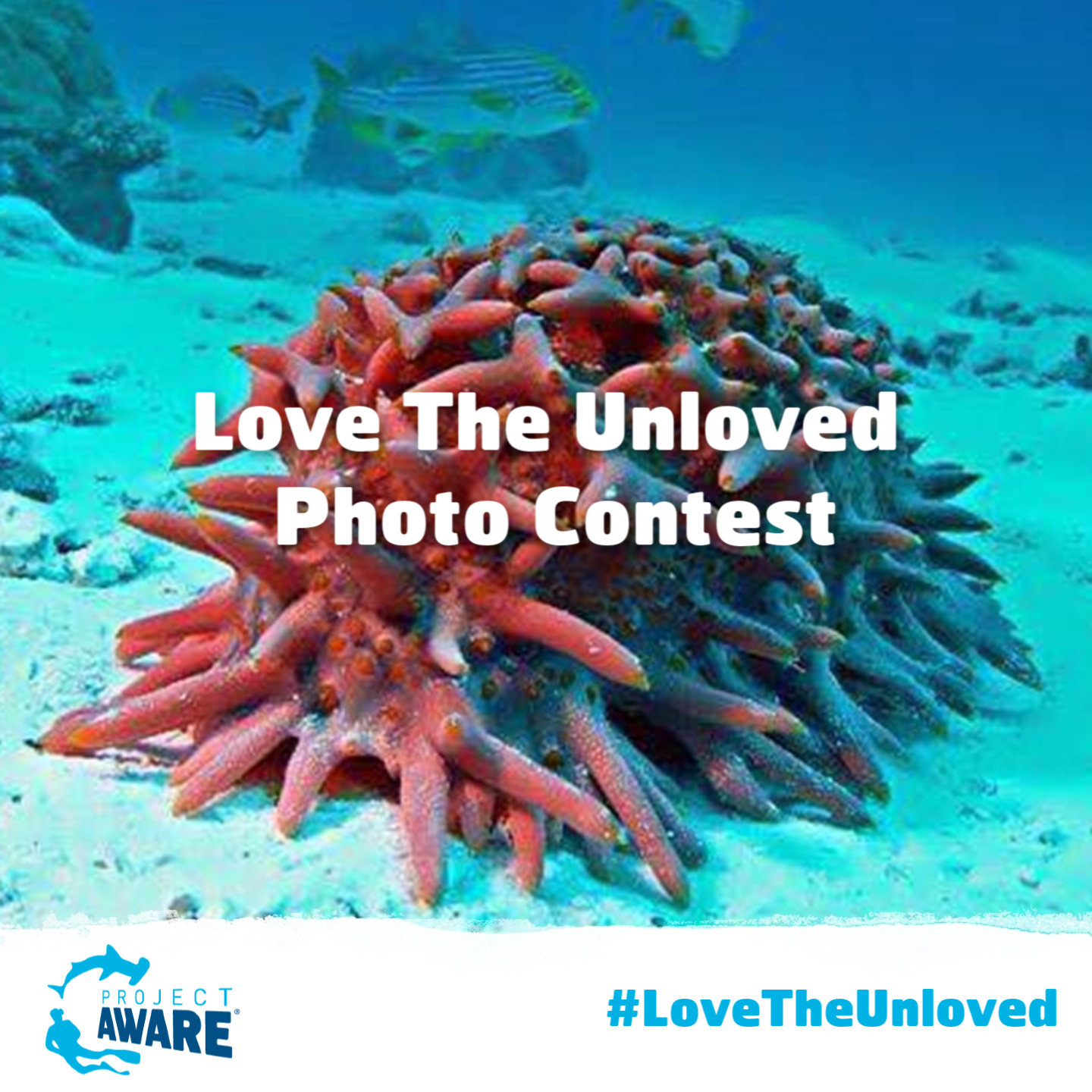
Join #Divers4Makos Around the Globe
Check out 4 Ways You Can Help Us #LoveTheUnloved
Fuel our Advocacy Work by making a gift today
Why CITES?
- With 183 Member Parties, CITES provides an international framework for monitoring and controlling trade between countries in species at risk and penalizing violations. CITES-listed species are subject to strict trade controls and verifications. For highly endangered species, commercial international trade in all CITES-listed species can essentially be shut down.
- International trade in shark and ray species, too often, drives overfishing, which - together with overconsumption and bycatch - drive depletion. Controlling international trade through this powerful tool for biodiversity conservation can help reduce the pressure on commercially valuable shark and ray populations.
- To date, more than 35,000 species of plants and animals are listed under CITES. Increased commitment by Parties to effectively implement the treaty has helped control global overexploitation of wildlife and improve legislation at the national level to enforce CITES. Increased regional communication among Parties has also improved conservation of wildlife across political borders.
- Project AWARE’s work at CITES CoP18 was part of a wider strategy to work with governments and advocate for policy change to help protect sharks and rays from overexploitation. The new Appendix II listing for mako sharks, if implemented properly, could provide useful information and data to Regional Fisheries Management Organisations and assist them in carrying out their mandate.
CITES and Sharks Over the Years
While CITES has helped restrict trade for a myriad of terrestrial species, the effort to list sharks and marine fish is still a relatively new ground and has resulted in difficult battles. Sharks have been on CITES agenda since 1994 with CITES trade controls going into effect for basking and whale sharks in 2002, great white sharks in 2004, and CITES trade ban for 6 out of the 7 sawfishes in 2007.
In 2010 - when eight worthy and heavily fished shark species were denied listing - more than 130,000 of us voiced our disappointment to CITES member countries.
Nearly 6 years of committed advocacy work later, we were thrilled that our collective voice was heard. Every single supporter played their part in securing these commitments.
Five species of highly traded sharks, both manta rays and one species of sawfish were listed under CITES at the conclusion of the 16th Meeting of the Conference of the Parties (CoP16) held in March 2013 in Bangkok, Thailand - with the new controls coming into effect 18 months later. It was a critical step forward in the long-term conservation of these highly traded species.
Thirteen Species of sharks and rays - devil rays, thresher sharks and the silky shark - were listed under CITES Appendix II at the conclusion of CITES CoP17 held in October 2016 in South Africa. The listing proposals were supported by more than the two-thirds majority required for adoption in Committee and finalized in Plenary.
Momentum for trade restrictions for sharks and rays continues to grow, with a record number of governments co-sponsoring one or more listing proposals in the lead-up to this year’s meeting of the Conference of the Parties (CoP18).
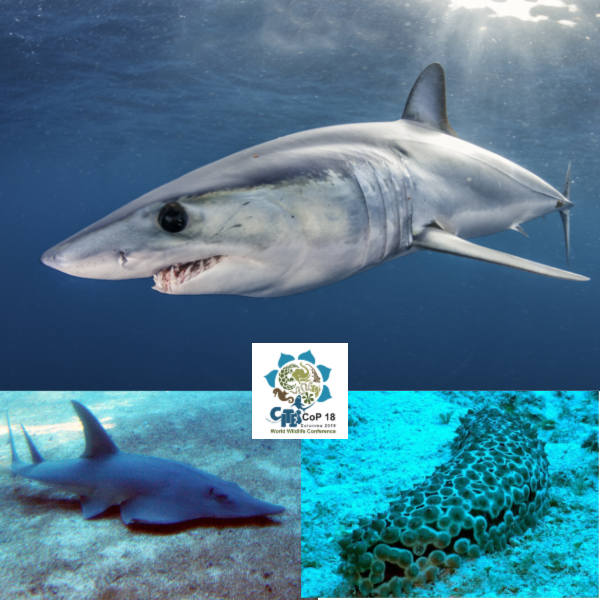 In August 2019, Ian Campbell, Project AWARE Associate Director Policy and Campaigns, headed to Switzerland to:
In August 2019, Ian Campbell, Project AWARE Associate Director Policy and Campaigns, headed to Switzerland to:
Meet with national governments to make the case to adopt all shark species up for consideration.
Offer support to lobby for the inclusion of sea cucumbers at the CoP18
Keep the pressure on the government officials to make sure they understand that our global community of ocean adventurers, people that they are meant to represent, have an eye on them
Together with our partners, we were successful in getting the proposed marine species listed, but we know that we can’t sit back and think “job done”. CITES only partially restricts international trade in listed species and doesn’t put any obligations on countries to reduce fishing pressure. We will make sure that if countries support the listing of mako sharks on CITES, then they will follow through with these commitments to actively reduce fishing pressure on makos and other vulnerable shark and ray species.
Although the tide is turning for sharks and rays, the listing of commercially valuable fish under CITES, and conservation and management measures aimed at combating unsustainable shark and ray fishing through international forums continue to face vigorous opposition. But Project AWARE is delivering a united voice in support of trade controls and sustainable fishing for the most vulnerable shark and ray species.
Your Support in Action
In April 2016, we applauded the growing support for proposals to control trade in thirteen commercially valuable shark and ray species. In the run-up to CITES CoP17, we mobilized our community and presented strong arguments in support of the devil rays, thresher sharks and silky shark Appendix II proposals submitted by the Maldives, Fiji, and Sri Lanka and supported by fifty CITES Parties including the European Union.
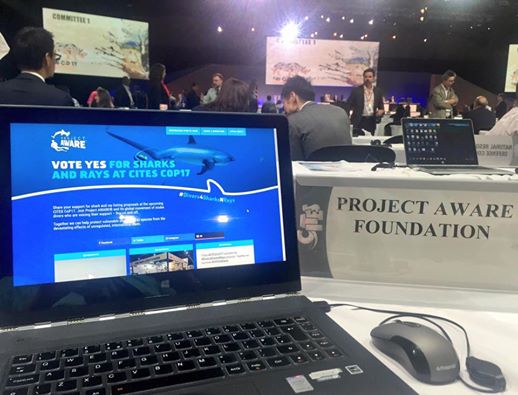 #Divers4SharksNRays - Project AWARE’s global campaign in the fight to save sharks and rays at risk - rallied the scuba diving community to encourage CITES Parties to vote YES for sharks and rays in September 2016 and show decision-makers that the dive community is serious about protecting sharks and rays from unsustainable, unmanaged and unregulated international trade.
#Divers4SharksNRays - Project AWARE’s global campaign in the fight to save sharks and rays at risk - rallied the scuba diving community to encourage CITES Parties to vote YES for sharks and rays in September 2016 and show decision-makers that the dive community is serious about protecting sharks and rays from unsustainable, unmanaged and unregulated international trade.
We know from previous historic advances in international shark and ray conservation that the dive community can contribute to helping win protections for vulnerable shark and ray species. Our collective voice has the power to help bring a positive outcome for marine species.



